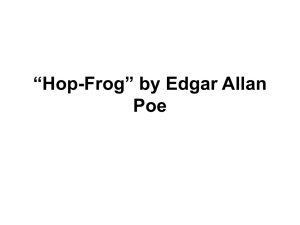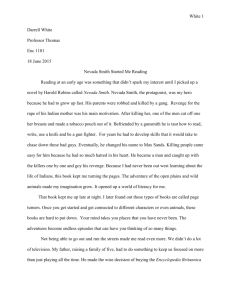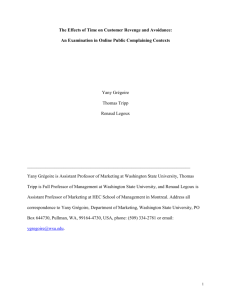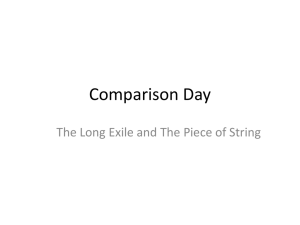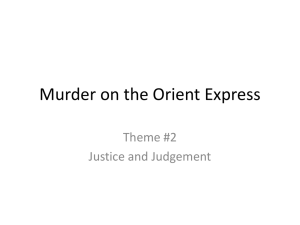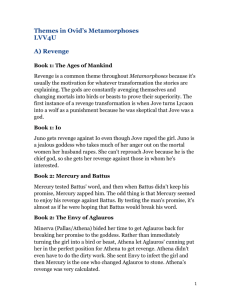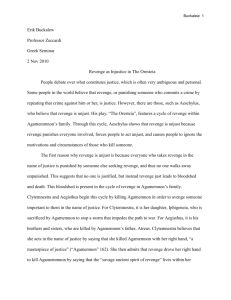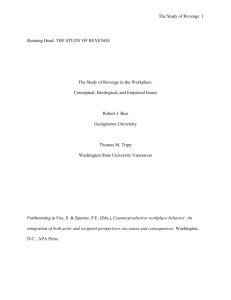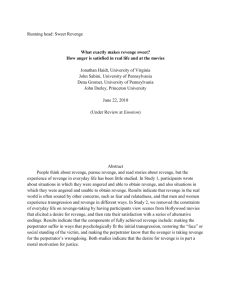Revenge, My Lovely
advertisement
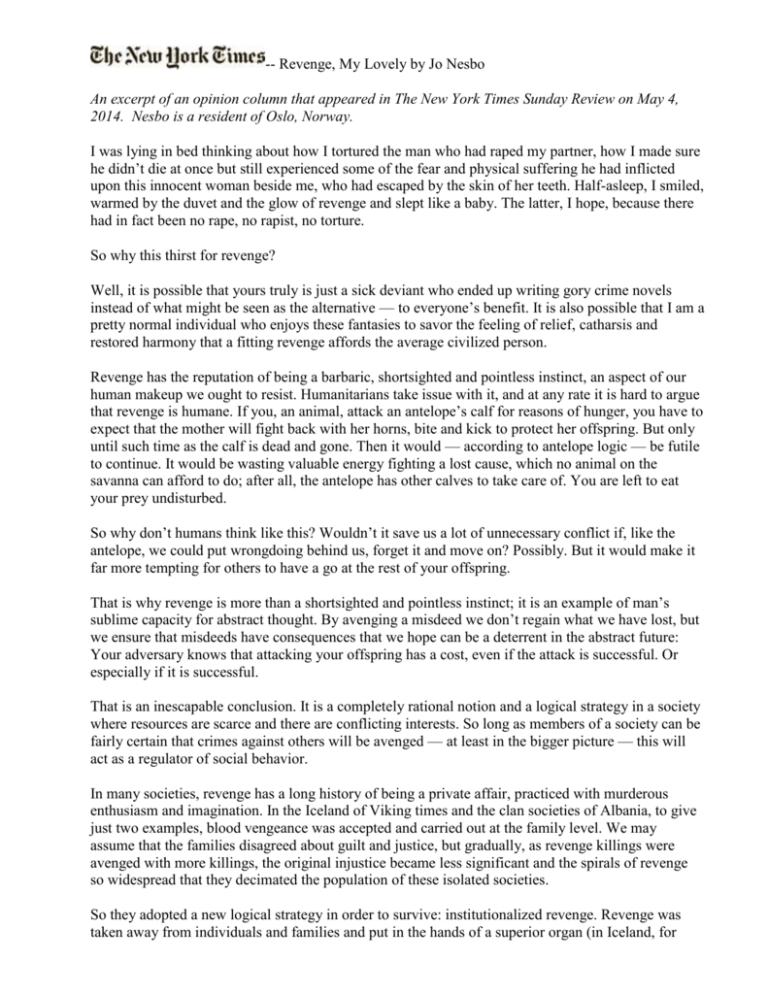
-- Revenge, My Lovely by Jo Nesbo An excerpt of an opinion column that appeared in The New York Times Sunday Review on May 4, 2014. Nesbo is a resident of Oslo, Norway. I was lying in bed thinking about how I tortured the man who had raped my partner, how I made sure he didn’t die at once but still experienced some of the fear and physical suffering he had inflicted upon this innocent woman beside me, who had escaped by the skin of her teeth. Half-asleep, I smiled, warmed by the duvet and the glow of revenge and slept like a baby. The latter, I hope, because there had in fact been no rape, no rapist, no torture. So why this thirst for revenge? Well, it is possible that yours truly is just a sick deviant who ended up writing gory crime novels instead of what might be seen as the alternative — to everyone’s benefit. It is also possible that I am a pretty normal individual who enjoys these fantasies to savor the feeling of relief, catharsis and restored harmony that a fitting revenge affords the average civilized person. Revenge has the reputation of being a barbaric, shortsighted and pointless instinct, an aspect of our human makeup we ought to resist. Humanitarians take issue with it, and at any rate it is hard to argue that revenge is humane. If you, an animal, attack an antelope’s calf for reasons of hunger, you have to expect that the mother will fight back with her horns, bite and kick to protect her offspring. But only until such time as the calf is dead and gone. Then it would — according to antelope logic — be futile to continue. It would be wasting valuable energy fighting a lost cause, which no animal on the savanna can afford to do; after all, the antelope has other calves to take care of. You are left to eat your prey undisturbed. So why don’t humans think like this? Wouldn’t it save us a lot of unnecessary conflict if, like the antelope, we could put wrongdoing behind us, forget it and move on? Possibly. But it would make it far more tempting for others to have a go at the rest of your offspring. That is why revenge is more than a shortsighted and pointless instinct; it is an example of man’s sublime capacity for abstract thought. By avenging a misdeed we don’t regain what we have lost, but we ensure that misdeeds have consequences that we hope can be a deterrent in the abstract future: Your adversary knows that attacking your offspring has a cost, even if the attack is successful. Or especially if it is successful. That is an inescapable conclusion. It is a completely rational notion and a logical strategy in a society where resources are scarce and there are conflicting interests. So long as members of a society can be fairly certain that crimes against others will be avenged — at least in the bigger picture — this will act as a regulator of social behavior. In many societies, revenge has a long history of being a private affair, practiced with murderous enthusiasm and imagination. In the Iceland of Viking times and the clan societies of Albania, to give just two examples, blood vengeance was accepted and carried out at the family level. We may assume that the families disagreed about guilt and justice, but gradually, as revenge killings were avenged with more killings, the original injustice became less significant and the spirals of revenge so widespread that they decimated the population of these isolated societies. So they adopted a new logical strategy in order to survive: institutionalized revenge. Revenge was taken away from individuals and families and put in the hands of a superior organ (in Iceland, for instance, it was the Althing) to decide disputes and matters of guilt and determine a suitable punishment for wrongdoing. The modern legal system was born. The revenge motive in law was slowly pushed into the background and replaced by less emotional, more rational and morally superior motives, like the deterrent effect of punishment, the safety of citizens and the opportunity for criminals to make amends. If you were to ask lawyers today about revenge, most would answer that there was no place for it in the modern legal system. And they will perhaps try to persuade you that when legal theorists and philosophers ponder on crime and punishment, they support either retributive justice (an eye for an eye, a tooth for a tooth), utilitarianism (whatever works to cut crime) or other lines of thinking, so no consideration is given to my perverse need for revenge. It is in effect only an unintended bonus of the system that it gives citizens satisfaction to know that the criminal is punished. Not on the rack, perhaps, but nevertheless suffering is inflicted. But is it really true that lawmakers and judges do not consciously take any account of our — sorry, my — petty sadism? “When we demand the repression of crime,” the philosopher and sociologist Émile Durkheim wrote, “it is because we are seeking not personal vengeance, but rather vengeance for something sacred which we vaguely feel is more or less outside and above us.” Yet “such a representation is assuredly an illusion. In one sense it is indeed ourselves that we are avenging, and ourselves to whom we afford satisfaction, since it is within us, and within us alone, that the feelings that have been offended are to be found. But this illusion is necessary.” Given that the legal system has historically been an avenger for the people, is the people’s thirst for revenge taken into sufficient account? The popularity of printed and filmed revenge fantasies suggests not. Batman, Dirty Harry, Lisbeth Salander, Charles Bronson in the “Death Wish” films make heroes of the man or woman who bypasses the legal system. They privatize revenge and take it further than any court of law would. Do these entertainments exclusively address people like me who can actually enjoy a fictional revenge for a fictional crime without believing that it should play any part in real life? Or is it the case that we go along with a legal system we don’t think meets our emotional need for retribution? A footnote. In a 2010 survey conducted in Scandinavian countries by the University of Oslo, a majority of those interviewed expressed the opinion that in general punishments were too lenient. Afterward they were asked to give a judgment on six real-life criminal cases. They gave the same sentences as the court, or something milder. So maybe we petty, vindictive sadists have already been taken into account and we are just not aware that we have been? Nesbo, Jo. “Revenge, My Lovely.” 5 May 2014. New York Times Sunday Review. Print.





